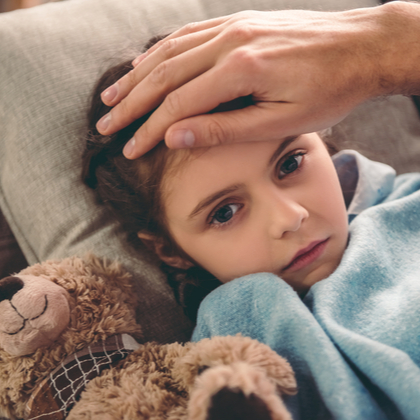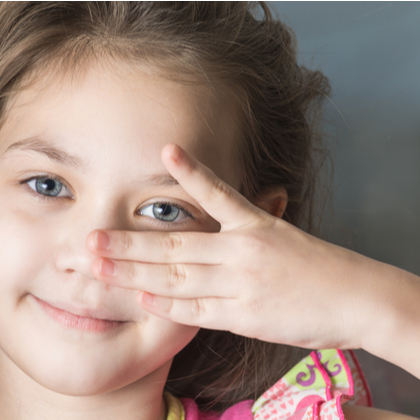
If your child seems to be catching every bug that’s going around, it may be distressing but it’s also normal. After all, children are particularly prone to getting sick when they’re young because their bodies are still building immunity to all those germs they encounter regularly in the school playground.
As a parent, it’s natural for you to want to stop your child ever getting sick. But not only is that very difficult – perhaps even impossible – to achieve, it’s also not advisable. That’s because being exposed to a variety of bugs will make your child’s immune system stronger, which can help them resist a range of illnesses as they get older.
It’s thought most children will catch at least one or more infectious illnesses at some stage – for instance, according to the National Institute for Health and Care Excellence (NICE), children experience an average of five to eight colds every year (compared with two to three colds a year in adults) (i).
Routine vaccines are available to protect children against more serious diseases. Many important childhood vaccines are available free on the NHS, with the first ones given when a baby is just two months old (or even earlier, as pregnant women can protect their unborn baby against whopping cough by getting a vaccine, typically when they are 28 - 32 weeks pregnant).
Besides making sure your child receives their vaccinations at the right times, you may want to be aware of the signs and symptoms of common childhood infections. It’s also a good idea to arm yourself with information on what you can do to make your little one feel better when they do bring a bug home from school.
How do infections spread in children?
Bugs that cause illness – or pathogens, to give them their scientific name – can spread easily in schools and nurseries because these are places where children play in close contact with one another. If one child is infected with a bug they can infect others through the air when they cough or sneeze. Infections can also be transmitted by objects or surfaces that an infected child has touched, coughed or sneezed over – if your child touches one of these objects or surfaces and then puts their hand on their mouth, nose or eyes, they can then become infected with the same bug.
This is why health experts recommend that parents teach their children good hygiene practices – including keeping their hands as clean as possible – early on, especially before they start nursery, day care or school. Other helpful hygiene practices you can pass on to your child include coughing or sneezing into their elbow, not sharing cups or cutlery and throwing used tissues into the bin immediately after use.
When should you take your child to a doctor?
While many common childhood infections can be treated easily at home, it’s important to get professional medical advice if you’re concerned in any way about your child. Also take them to see their GP if your child doesn’t start to improve after a day or two of being looked after at home, if their symptoms are getting worse, or if any of the following apply:
-
They have pain that doesn’t get better after taking children’s paracetamol or ibuprofen.
-
They have a high temperature that doesn’t improve within five days (see our guide to Children’s health: fever or high temperature for more essential details).
-
They’re having persistent vomiting and/or diarrhoea (that is, they have vomited three or more times or have had diarrhoea six or more times in 24 hours).
-
They refuse to drink anything or can’t keep liquids down.
-
They’re producing fewer than half their usual number of wet nappies.
-
They are aged three months or younger and have a fever or aren’t feeding as well as usual.
Take them to see their doctor straight away or call for an ambulance if…
-
They are having breathing difficulties.
-
They look very pale and are hard to wake.
-
They have a rash combined with a headache, stiff neck or back pain.
-
They have a rash or spots that don’t disappear when you place the side of a clear glass against them (read our guide to Septicaemia and meningitis in children to find out more details about the danger signs to look out for).
Colds, coughs and sore throats
Colds
What are the symptoms of a common cold?
Children get more colds than adults not just because the bugs are passed around more easily when they’re at school but also because their immunity is lower. There are hundreds of different viruses that cause colds, and young children have to build up their immunity to them gradually.
Symptoms of a cold include sneezing, a runny or stuffy nose and sometimes fever, along with a sore throat or a cough (see below). The good news is most colds get better in children in five to seven days, but small children can take up to two weeks to recover (ii).
What cold medicines and remedies are good for kids?
-
Make sure they drink plenty of fluids (they should drink more than normal).
-
If they have a high temperature or are in any pain, give them children’s paracetamol or ibuprofen – always follow the instructions on the label or check with your GP or a pharmacist if you’re not sure about anything (for instance, ibuprofen isn’t suitable for all children, including those who have asthma).
-
Try using saline nasal drops to relieve or clear their stuffy nose, or try applying a vapour rub on their chest and neck.
-
Give them nutritious food, but don’t worry if they don’t feel like eating, as it’s normal for children to lose their appetite for a day or two when they’re under the weather.
-
Encourage everyone else in the family to wash their hands regularly, as this can help stop the cold spreading throughout the household.
Coughs
When should you worry about a cough in a child?
Coughing – which often happens when a child has a cold – helps clear away phlegm from the chest or mucus from the back of the throat. Parents can be alarmed when their child starts coughing, but if they aren’t having breathing difficulties or wheezing, and they’re eating and drinking, it shouldn’t be anything to worry about.
You should, however, take them to see their GP if they’ve had a cough that’s lasted more than three weeks or if they have a cough with a high temperature. If they have a cough and are also finding it hard to breathe, call for an ambulance as they may be having an asthma attack.
How can I stop my child from coughing?
-
Make sure they aren’t exposed to cigarette smoke, as this will irritate their lungs (it can also irritate their throat, nose and ears).
-
Give them a drink of warm lemon and honey (add the juice of half a lemon and one or two teaspoons of honey to warm – not hot – water). Do not, however, give honey to children younger than a year old.
-
If your child is aged six or older, try giving them a menthol or medicated sweet to suck.
-
Vapour rubs can help with coughs too.
Sore throats
When should I be concerned about my child's sore throat?
If your child has a sore throat, it could be an early sign that they are coming down with a cold or flu. The soreness shouldn’t last more than a few days, but if it continues for longer and your child also has a high temperature and is generally unwell, take them to see their GP.
A sore throat can also be a sign of tonsillitis, which is a common childhood illness. This is not contagious, and the symptoms – sore throat, problems swallowing, raised temperature, headache, earache and feeling sick or tired – usually last for three or four days.
What can you give a child for a sore throat?
-
Give your child some children’s paracetamol or ibuprofen to ease the pain.
-
Make sure they drink plenty of fluids, which will make their throat feel less dry and painful. Cool drinks can be particularly soothing.
-
Giving them softer and cooler foods can also be helpful.
-
If they have tonsillitis, make sure they get plenty of rest too. And if their doctor has prescribed antibiotics to treat the infection, make sure your child takes them exactly as their doctor has instructed.
Natural support for children's immunity
You may not be able to stop your child going down with a cough, cold or sore throat, but there are things you can do to support their immune system while they’re sick and to help keep their immunity strong when they’re well.
Good nutrition is important for keeping your child as healthy as possible, which means keeping their immune system healthy too. So try to make sure they get at least five portions of fruit and vegetables every day, as this means their body will be getting a good range of nutrients.
You may also want to consider giving them a multivitamin and mineral supplement – especially if they are a fussy eater. Choose a good-quality supplement designed for children that will give them all the important vitamins and minerals their immune system needs. If they don’t like swallowing tablets there are other options, such as effervescent multivitamin and mineral tablets that dissolve in water to make a pleasant-tasting drink, as well as tasty chewable multivitamin and mineral tablets (look for one that’s kind to their teeth).
Not sure what to choose? Take a look at our guide to Multivitamins for children to help you decide.
High-strength fish oils You may also want to consider giving your child a fish oil supplement, since the omega-3 fatty acids found in oily fish such as salmon, herring, mackerel and sardines are widely thought to be helpful for children’s general health (plus they’re ideal for kids who don’t like the taste of fish). Fish oil supplements often tend to be quite large, so look for one that comes in a small capsule size that a child can swallow easily.
Elderberry Grown on the Sambucus tree, elderberries have a long traditional use for the relief of colds and flu. Look for a good-quality, naturally sweetened elderberry liquid that your child will love to take straight off the spoon.
Vitamin C This is an important vitamin that’s needed for many body processes. Experts also believe that not getting enough vitamin C may weaken a child’s immune system (iii). You can find vitamin C in multivitamin and mineral supplements, but it’s also available as a single supplement.
Zinc We all need zinc for a healthy immune system, but many of us – including children – may not be getting enough of it in our diets. Foods that contain good levels of zinc include meat, shellfish, legumes, nuts, seeds, dairy foods, eggs and whole grains. If your child doesn’t eat many zinc-rich foods, a supplement may be the answer. Most good-quality multivitamin and mineral supplements will contain a decent level of zinc, but you could also try giving them zinc lozenges (these not only taste nice but you can get them with added vitamin C too).
Vitamin D Children need to get the right amount of vitamin D for their immune systems to function normally. These days, the government recommends that all children from birth to four years old take a daily vitamin D supplement throughout the year, while those who are four years and older should take it during the autumn and winter months (though there’s a good argument for giving children of any age vitamin D supplements all year round if they don’t spend much time outdoors in the spring and summer months or if they usually wear clothes that cover up most of their skin when they’re outdoors).
Again, you can give your child the vitamin D they need in a good multivitamin supplement. Alternatively there are vitamin D supplements available – and if your child doesn’t like taking tablets, you can give them vitamin D drops.
It’s never easy for parents when their children are sick, but having common mild infections like coughs and colds is normal and it even makes their immunity stronger and healthier. Knowing the difference between a mild infection you can treat at home and something that may be more serious is essential for all parents – plus it can also be helpful to know how to soothe their symptoms when you’re looking after them. There’s lots more information on children’s and adults’ health conditions in our pharmacy health library – why not take a look around?
References:
(i) Available online: https://cks.nice.org.uk/topics/common-cold/background-information/prevalence/(ii) Available online: https://www.nhs.uk/conditions/baby/health/colds-coughs-and-ear-infections-in-children/
(iii) Maggini S, Wenzlaff S, Hornig S. Essential role of vitamin C and zinc in child immunity and health. J Int Med Res. Mar-Apr 2010;38(2):386-414. Available online: https://journals.sagepub.com/doi/10.1177/147323001003800203
Related Posts
Disclaimer: The information presented by Nature's Best is for informational purposes only. It is based on scientific studies (human, animal, or in vitro), clinical experience, or traditional usage as cited in each article. The results reported may not necessarily occur in all individuals. Self-treatment is not recommended for life-threatening conditions that require medical treatment under a doctor's care. For many of the conditions discussed, treatment with prescription or over the counter medication is also available. Consult your doctor, practitioner, and/or pharmacist for any health problem and before using any supplements or before making any changes in prescribed medications.

Christine
Christine Morgan has been a freelance health and wellbeing journalist for almost 20 years, having written for numerous publications including the Daily Mirror, S Magazine, Top Sante, Healthy, Woman & Home, Zest, Allergy, Healthy Times and Pregnancy & Birth; she has also edited several titles such as Women’ Health, Shine’s Real Health & Beauty and All About Health.
View More



